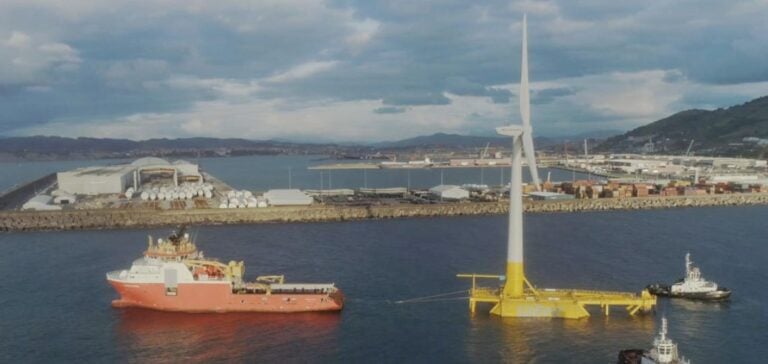Saitec Offshore Technologies and RWE have launched the DemoSATH Lab program to increase knowledge of the environmental impact of floating wind turbines.
The program focuses on three areas of research: interactions with birdlife, underwater noise and marine biodiversity.
The DemoSATH turbine, installed 3.2 km off the Basque coast and operational since September 2023, is the centerpiece of this initiative.
DemoSATH Lab program objectives
The DemoSATH Lab program focuses on three main areas of research: interactions with birdlife, underwater noise and marine biodiversity.
Studies will extend to the end of 2025, covering several seasons and weather conditions.
Interactions with avifauna are being studied using the DTBird monitoring system, already installed on the DemoSATH platform.
The aim is to understand how birds interact with floating wind turbines, and to improve detection algorithms to minimize their impact.
Underwater noise is fully monitored during the operational phase of DemoSATH.
The results will be compared with noise profiles measured before installation and during turbine commissioning.
This analysis will help to understand the overall impact of noise from floating wind turbines on the marine environment.
Marine biodiversity study
To study marine biodiversity, a Remotely Operated Vehicle (ROV) will be periodically deployed to observe the interaction of aquatic life with the DemoSATH structure.
This monitoring will provide valuable information on the presence, abundance and behavior of species around the floating turbine.
The DemoSATH project, located off the Basque coast in the Biscay Marine Energy Platform (BiMEP) test area at Armintza, marks a first in the integration of floating wind turbine technology into the Spanish energy mix.
Scheduled for installation in September 2023, the 2-megawatt turbine will generate the equivalent annual electricity consumption of 2,000 Spanish households.
Perspectives and collaborations
This project represents a collaboration between Saitec Offshore Technologies, developer of the SATH technology, RWE, project developer with extensive expertise in the offshore wind sector, and Kansai Electric Power Co. Inc. (KEPCO), with its extensive experience in the energy market.
Javier Del Real, Environmental Manager at Saitec Offshore Technologies, stresses the importance of these studies in improving the ecological suitability of SATH technology and developing floating wind projects that respect the marine environment.
Martin Dörnhöfer, Head of Floating Wind at RWE Offshore Wind GmbH, says that this pioneering initiative in floating wind enables RWE to better understand key biodiversity aspects associated with floating turbines, such as underwater noise and interactions with birds, thus ensuring future development in harmony with nature.
The advanced environmental studies carried out by the DemoSATH Lab program will provide crucial information for the sustainable development of floating wind turbines.
This knowledge will help minimize the environmental impact of future projects and ensure harmonious coexistence with the marine ecosystem, reinforcing Saitec and RWE’s commitment to environmentally-friendly renewable energies.






















